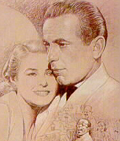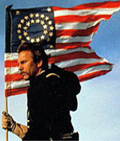Study Guide -
Dr. Strangelove or: How I Learned to Stop
Worrying and Love the Bomb (1964)
Director :Stanley Kubrick
Stars :
Peter Sellers .... Group Captain (G/C) Lionel Mandrake/President Merkin Muffley/Dr. Strangelove
George C. Scott .... Gen. 'Buck' Turgidson
Sterling Hayden .... Brig. Gen. Jack D. Ripper
Keenan Wynn .... Col. 'Bat' Guano
Slim Pickens .... Maj. T.J. 'King' Kong
Peter Bull .... Russian Ambassador Alexi de Sadesky
James Earl Jones .... Lt. Lothar Zogg
Tracy Reed .... Miss Foreign Affairs
Preparation :
Read the filmsite.org review
Historical/Social Significance :
Dr. Strangelove opened in January 1964, denouncing the nuclear arms race and its players only a few months after American President John F. Kennedy and Soviet Premier Nikita Khrushchev signed a treaty banning the atmospheric testing of nuclear weapons. More importantly, these same two leaders had been on the verge of taking their countries to war only two years before in a showdown over Cuba, so the American people were well aware of how it felt to be on the edge of nuclear disaster. In October 1962 President Kennedy threatened Soviet Premier Khrushchev with war if Soviet missile bases on Cuba were not dismantled and shipments of arms bound for the island were not aborted. The country waited for one tense week for the nuclear bombing to begin--but it never happened. Khrushchev blinked and prevented the end of civilization. 1
"To a greater extent than anyone might believe, Dr. Strangelove faithfully mirrors this historic epoch in which the world's fate often seemed hostage to accident, miscalculation and human fallibility." (Past Imperfect)
"Director Stanley Kubrick and his co-writers convey all too accurately the weird logic of deterrence theory, the paranoia of the Cold War, and the nuclear jitters of the early 1960's." (Past Imperfect)
Synopsis :
The fate of the country rests with General Ripper and Dr. Strangelove and the rest of the characters at the Pentagon. Are we in good hands? I think not.
Guided Questions for Viewing :
Assessment questions will be based on the following :
-
"It is an anti-American tract unmatched in invective by even our declared enemies." (Letter to the NY Times) What do you feel about this statement?
-
"To a nation that was living through the stress of the nuclear arms race and had faced the real prospect of nuclear war, the satiric treatment of the nation's leaders was an release from deep fears and tensions. " (Allan). Comment on this statement with reference to the film.
-
Kubrick, dipping into the reservoir of icons and rhetoric of the Cold War, exorcised the demons of nuclear culture from the nation's collective unconscious and encouraged dissent. ...the United States of the mid-1960s was caught between right-wing militarism and the emerging generation of pacifists, whose slogan of "Make love, not war" would make the decade a turning point in American culture. What does this statement mean to you?
-
Do you feel that a movie like Dr. Strangelove can really do something to change the way the country looks at a situation? Do you know of any other movie that has done this?
-
Do you think President Muffley right to try to call back the bombers and to give the Soviets information so that they could shoot down the bombers that could not be called back?
-
Drawing on your assessment of the film, which do you think exerted a more unsettling effect: the existence of the weapons or the people in charge? What is the movie saying about the cause of the Cold War?
-
The character Dr. Strangelove appears in only a few scenes in the film. Why is the film named after him?
-
Kubrick obviously had strong opinions about the threat of nuclear war, yet he chose a comedy as the vehicle to get his point across. What is his point and did he get his point across successfully?
-
"I am glad that I managed to write The Crucible, but looking back I have often wished that I'd had the temperament to do an absurd comedy, which is what the situation deserved." Arthur Miller (2000). Comment on this statement by Arthur Miller with reference to Dr. Strangelove
-
Lawrence Mumford, for one, thought the fil was the first break in the nations "cold war trance." He observed, "What has masked the hideous nature of our demoralized strtegy of total extermination is just the fact that it has been the work of otherwise well-balanced, responsible men...What the wacky characters in ,i>Dr. Strangelove,/i> are saying is precisely what needs to be said : this nightmare eventually that we have concocted for our children is nothing but a crazy fantasy, by nature as horribly crippled and dehumanized as Dr. Strangelove himself."2
Sources:
1. Allan, Prof. Blaine. "Just What the Doctor Ordered : Cold War Purging, Political Dissent and the Right Hand of Dr. Strangelove". http://www.film.queensu.ca/Boxen.html
2. Lawrence Suis. "The Pentagon and Hollywood : American History/American Film". Ed. John O'Connor and Martin Jackson.
3. Dirks, Tom. "Dr. Strangelove". http://filmsite.org/stra.html
4. Boyer, Paul. "Dr. Stangelove" Past Imperfect : History According to the Movies Ed. Mark Carnes. (1996)
|



